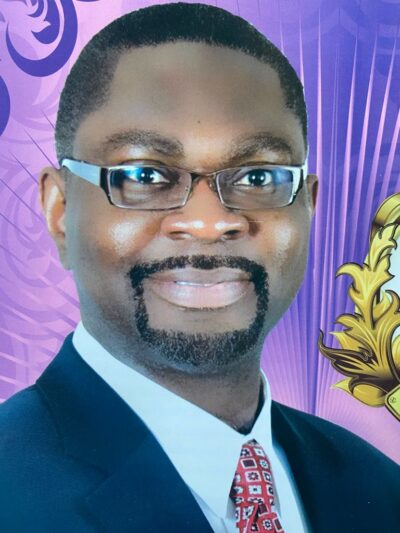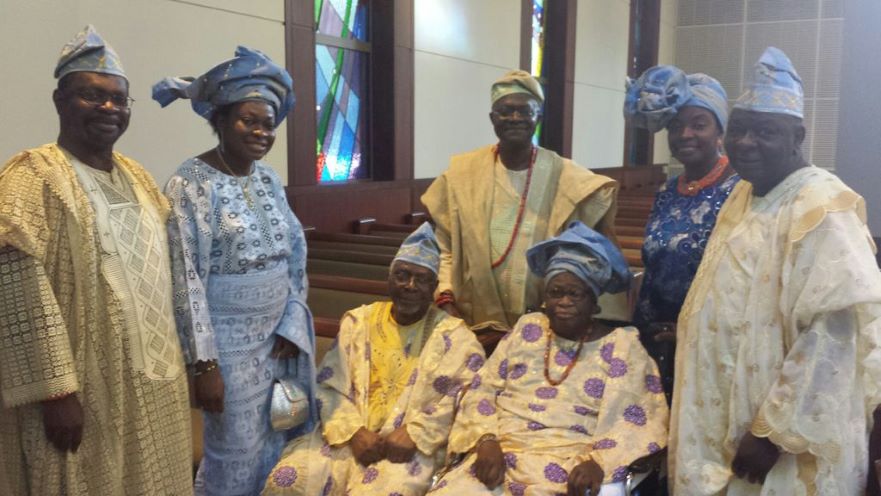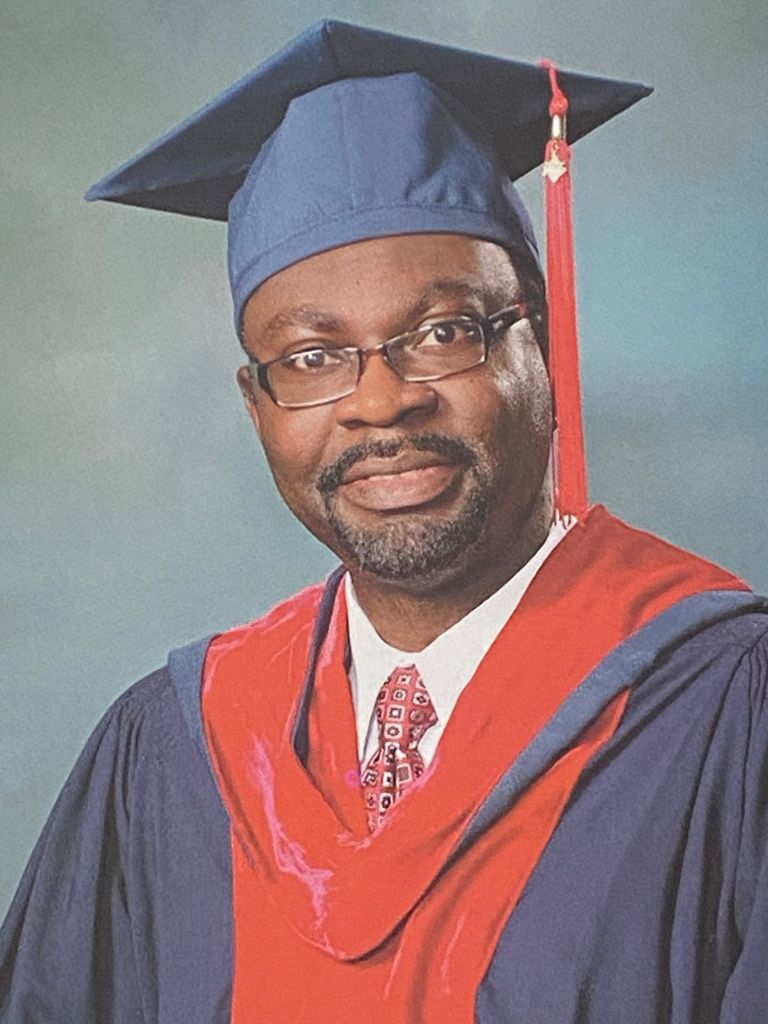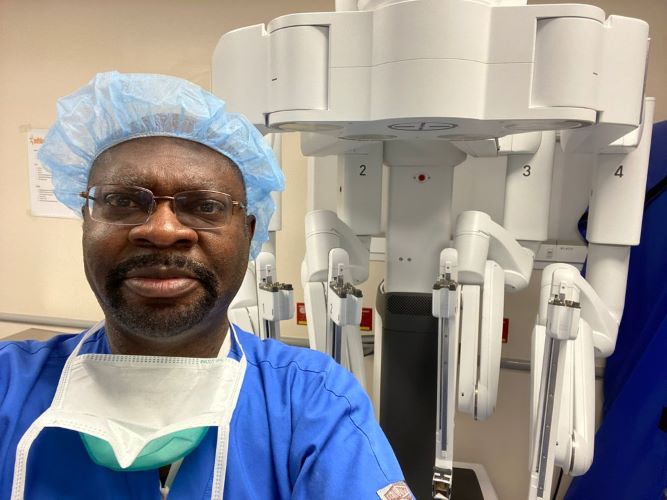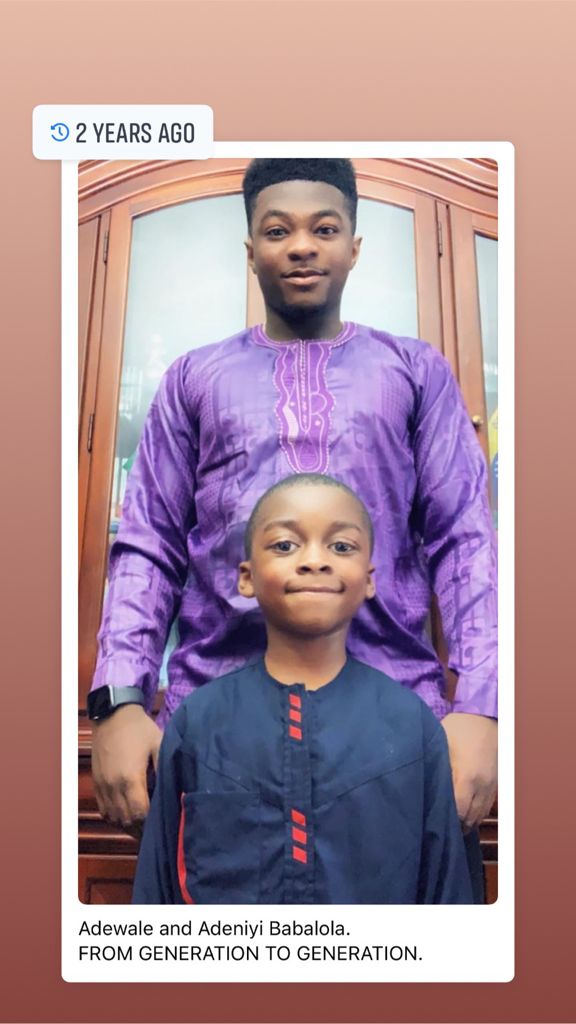Dr. Adejinle Babalola is a Clinical Professor of Surgery at Hofstra Northwell School of Medicine, New York, and Presiding Apostle of Living Water Kingdom Ministries Inc, He has been in the US for 25 years practicing Medicine and has been the recipient of several awards including America’s Top Surgeons award. That was about 10 years ago.
He has also been honoured as one of the top 20 Nigerians doing great things in the US. He is an Attending General Surgeon and Fellow, American College of Surgeons.
Interestingly, Dr. Adejinle was one of the first set of students at Ijebu Ife Community Grammar School; Ogun State back in Nigeria.
He told Church Times in this long but engaging interview that the Lord has given him the grace to excel in both ministry work and medicine. Excerpts:
Let’s talk about your background. Where exactly are you from, what was your growing up like?
I am from Oke-Ila Orangun, Ifedayo Local Government of Osun State, Nigeria. Oke Ila is close to Kwara and Ekiti States. I was born in 1964 at the Baptist Medical Centre, Ogbomoso, Oyo State, when my parents were Seminary Students at Nigerian Baptist Theological Seminary.
I had a great upbringing. My parents led me to Christ when I was about 10 years old. I grew up with them and got to see how to live a Christian life. Looking back, I must say, I learnt ministry from them primarily. I very much appreciate all that they did to impact me in my early years.
Did you set out to be a medical doctor or its something you stumbled on later in life?
I was already entertaining the thought of becoming a medical doctor right from primary school. I remember while in primary six my ambition was to be health prefect for the school. That was as far as I could remember.
So you began working towards it?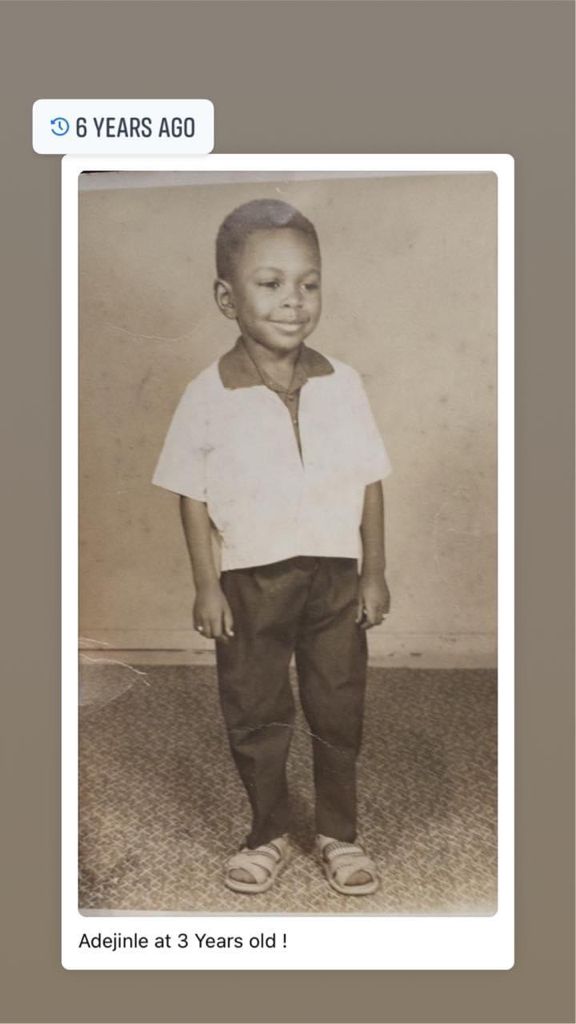
I did work towards it. I was working towards studying medicine at the University of Ibadan. But because of the competition and other factors, I was not admitted for medicine on the two occasions that I applied. Eventually, I had to settle for Biochemistry. I did my youth service and worked with Nigeria Baptist Convention. I worked then as a Literature Writer, writing Bible Study and Mission Study for the Convention. That became easy for me because I had been involved in fellowship activities while in the university. I was in leadership with the Baptist Student Fellowship and IVCU.
I later did a Master’s in Biochemistry. My brother had tried to bring me to the US during my undergraduate days. But my parents did not get the leading to release me until after I had done my master’s degree. Eventually, I traveled to the US to study for a Ph.D. in Pharmacology or Biochemistry. I did not get to study Medicine immediately. I did another master’s programme in chemistry and was running a Ph.D. in Public Health before I eventually got admission to study Medicine at the University of Wisconsin. In all, I spent 10 years after my first degree before I got into studying medicine.
You were born at Ogbomoso, you grew up at Ibadan. Why did you have to go to Ijebu Ife community Grammar School for your secondary education?
At that time one of the proprietors of Ijebu Ife Community Grammar School, Chief Olajide Adebanjo was a member of the church my Dad was pastoring at Ibadan. My father was pastor at Oke-Ado Baptist Church Ibadan, Oyo State. Chief Adebanjo knew my father and I guess he thought I was a brilliant chap. So he appealed to my Dad and Mum to allow me to come to Ijebu Ife Community Grammar School. He wanted the school to have some reputation. By then I had already gotten admission to Ibadan Grammar School when he convinced my father to bring me to Ijebu Ife Community Grammer School. Eventually, they agreed to send me to the school after they had prayed about it. That was how I declined my admission to Ibadan Grammar School and moved to Ijebu-Ife Community Grammar School.
That must have made some sacrifice and risk at the same time because you were to be among the first set of students of a school that was unknown?
Yes. It was a sacrifice and a risk giving up Ibadan Grammar School for IfecoGrams. But my parents just demonstrated faith in God. When I look back now, I give glory to God. I am what I am today because of the solid foundation I had at Ijebu Ife Community Grammar School.
The school wanted us to do well. They poured more into teachers and invested in our learning. Chief Adebanjo and others were always hunting for teachers who could teach well. They pushed us and motivated us. Those things helped us to work hard and study hard. We had personal aspirations. Many in our class were determined to be successful in life.
It will surprise you to know that it was few months before the WAEC exams that we got approval to do Sciences. Most of us in sciences would not have been in the sciences if the approval did not come through. In those days the government would come and inspect the school’s laboratory and equipment. If those things were not in place, the school would not be approved to write science subjects in WAEC.
Would you say your brilliant performance and that of your colleagues was a function of the school or the quality of students in the school?
We give glory to God. I think it is multi-factorial. For success in life, you need God and good people that will mentor you and you need to be focused. God’s principle includes hard work. But you can’t rule out spiritual interventions.
Apparently, you did not work with your degree in Biochemistry before you left Nigeria?
As at that time in Nigeria, unemployment was high. But like I said earlier I worked as a Literature Writer for the Nigeria Baptist Convention. But in January 1988 I relocated to the US. God opened the way. I first attended Texas Southern University and the University of South Carolin. After I took the MCAT, Medical College Admission Test, the University of Wisconsin Medical School actually wrote me a letter inviting me to apply to their Medical School. That was how I got into the University of Wisconsin to study medicine. I later found out that the university is one of the best universities in the US.
Studying Medicine for you would have been a walk-over since you had a first and second degree in Biochemistry. You were even working towards a Ph.D. in Public Health?
It was not a walkover. Medicine is never a walkover for anybody no matter how smart you are. Maybe because of the biochemistry background it was easier for me. But it was not a walkover. The school actually asked me to test out of Biochemistry classes meaning if I take an exam and pass, I won’t have to go through the class. But I decided to go through the class because I wanted an A so that my GPA would be high. Medicine is always a challenge even for smart people
You are an Apostle, a Preacher of the gospel, and also a Medical Doctor. How compatible are these two professions?
Looking at it from this end, I see how easily compatible they are. In the beginning, I didn’t see it that way. I know how committed my parents were to ministry and I saw the challenges. I did not want to be a Pastor. But then, God was using me from the onset and people were saying I would be a Pastor, and I would tell them it won’t happen. But as time went on, I got deep into ministry. People recognised God’s grace in my life. I remember getting so much involved in ministry work as far back as 1982. I was involved in the then city-wide crusade at Ibadan.
Talking about the compatibility of ministry and medicine, I believe God always has spiritual and physical health goals for us. For me, I think ministry and medicine are merged in God. It’s the spirit man that we use to link with God. On the other hand, without the body, we can’t be the best God wants us to be. I tell people however that my primary calling is ministry while my secondary calling is medicine. But then I spend more time in my medical practice.
How then do you combine medicine and ministry in a humanist environment like the US?
People talk based on their understanding and knowledge. But when they have life challenges they become vulnerable and are open to help. When people are sick they open up to get help from God. That is where I come in to share the gospel with them.
When people discuss philosophical issues at work I join the discussion and use the opportunity to discuss the theological bent of their philosophy and then allow the Holy Spirit to take over their heart from there
We hear of cases of people victimised for sharing the gospel in public institutions in the West. How do you handle this from your end?
I am aware of the law and I stay within the law. I don’t make myself vulnerable or being accused of doing something illegal. I let people lead and then later direct the discussion. I remember many have got into trouble for what the government calls proselyting ie trying to convert people by all means.
For instance, doctors are not allowed to pray with their patients. But if a patient asked me to pray, I am covered. I ask patients what coping and support system they have. So what I do is to ask the patient if they pray and if he would like me to pray. If he approves it, I won’t have any issues.
I remember when I was in Surgery Residency, one of the students brought up an issue. She said she was a universalist. These are people who believe in all faiths. I expressed a contrary opinion and gave reasons. She went and reported me to the authority of the medical school. So I was summoned and queried by the authorities. But then, I told them she was the one who first expressed her religious views. I also said I have freedom of speech and freedom of religion. When they discovered they were not going to make a headway with the case, they immediately allowed me to go.
I must confess that this issue is a landmine area sometimes if you work in a secular organisation they don’t want you to talk about God. The West has become a post-Christian society, unfortunately. But I believe we can still witness by being circumspect.
You have practiced medicine for 25 years in the US. That is no mean feat. What has been your experience of God in your practice?
I have experienced several interventions from God in the course of my practice. I practice General Surgery and Advanced Laparoscopic Surgery. I thank God for giving me the grace to get into Surgery and to acquire more Surgical skills over the years. There have been several times God has helped me in little ways and in big ways.
I remember I once attended to somebody who sustained a gunshot wound. But the patient was stable. I asked the provider in the hospital over the phone where the shot entered and where it exited. From dealing with similar cases in the past, I suspected the patient had an injury on the Inferior Venal Cava (IVC) which is the big vein that carries blood from the body back to the heart.
I instructed them to call the Operating Room to get ready, I will be operating on the patient. I was so sure the trajectory of the bullet would have injured the IVC. In the beginning, we did not find the injury. But I persisted. I invited a Vascular Surgeon into the OR and he said we did not need to go further looking for where the patient was injured.
But I persisted. As God would have it we found the spot of the injury. We found a hole at the posterior wall and another hole at the anterior wall of the IVC and we were able to fix it. If we had not done that the patient would have died from the injury. That was what God can do if you are being led by him.
There was the case of a patient we were operating on in the Operating Room. Suddenly several instruments we were using just stopped working. All of a sudden I started praying in tongues for a while and I gave those working with me, instructions. Not long after praying in tongues, all the instruments came back to life. After we had successfully carried out the surgery and we were chatting outside the Operating Room, the guys who worked with me said, “The situation was so bad that Dr. Babalola was speaking an African language.” I just laughed, they did not know I praying in the spirit in tongues. They thought I was speaking an African language.
For those of us that are not medically inclined, we wonder how you cut people open to work on them. What influenced your love for Surgery?
You are right. It is very interesting and mind-boggling that a surgeon can cut people open to remove the ailment in them and put them back again. Sometimes I am forced to look back and wonder what got me interested in medicine in the first place. But then, I recall that my father taught me a lot of biology when I was in secondary school. I recall also that when I was at Ijebu Ife Community Grammar School we did some experiments with toads. We would cut them open and dissect them in our biology class.
We were able to look at the thoracic and abdominal cavities of the toad and studied them. That experience perhaps informed my interest in surgery. I also preferred to do things that are hard when I was younger. The beauty of surgery is that people recover fast most of the time after it. It is very amazing seeing what God does through surgery.
Do you think some of the fears we express as lay people that something could go wrong during surgery is justifiable?
Yes and no. If I am having surgery, I will have concerns; not fear because I know what could go wrong. But generally, I think the risk factors depend on the person carrying out the surgery, the hospital where the surgery is being done, and the locale where the hospital is. Some of the fears are justifiable especially when we hear of bad cases. But some are not. One has to be careful who does the surgery and the hospital where it is done. But generally, I think there is a lot of improvement in the surgical outcomes compared to what was obtained years back.
How was the first time you had to carry out surgery on a patient?
Surgeons are trained by apprenticeship. A trained surgeon is always with the trainee surgeon. While in training the experienced surgeon carries out the surgery while the one in training observes the process. Then they will give you the less important part of the surgery to do. As time goes on, you will do a more important part. You are guided through it to be sure you are proficient in one level before going to the next level. So it’s not that they just allow you to start working on a patient without supervision
Looking back do you feel when you lose a patient?
Because we treat human beings, there are inevitable times for people to die. We do everything possible to save people but by default people still die. You feel bad for the patient and for the family members. Because we are professionals we don’t show how it affects us too much. It does affect us but we have to minimize the emotional part of the pain so as to encourage the acquaintances of the patient. We also have to be emotionally and intellectually at our best for the other patients that need our care.
There are cases that defy medicine. People say they are spiritual. How will you react to this?
I am knowledgeable in Demonology and Deliverance for some decades now. I was involved with casting out demons in the 80s and that exposed me to spiritual cases of sickness and made me believe that sickness is both spiritual and physical. You deal with the two as the cases cause are. There are spiritual things that don’t respond to physical intervention.
There are also physical cases that won’t respond to spiritual interventions. There are cases that we have to apply both the spiritual and physical. Remember Hezekiah in the Bible was to die. But he prayed and asked for divine intervention. God added to his life. And God still had to instruct the prophet to prepare poultice, the medication for him. God is the God of divine healing. It was after God healed him that the medication worked for him and he was healed.
People say there are no demons in the US, that all the demons have been driven to Africa. How will you react to this?
There is nowhere there are no demons, it depends on their manifestations. We just have different types of demons and challenges. Every culture has demonic oppression that Jesus only can deliver from.
Looking back what is your submission about how far God has taken you?
Sometimes I look back and I am amazed at what God has done through an ordinary person like me. God always has a destiny for each person. Unfortunately, we don’t always understand what God has for us. I found my destiny and I am living its reality. That is worth being grateful for. There is no way I could have seen myself in my younger years getting this far in life. I give all the glory and all the praise to God.
You said your primary calling is ministry. Kindly tell us about your ministry and how is your family involved?
My ministry is an itinerary Apostolic Ministry. It is not a congregational one. I asked God if I should start a church and he said he had called me to both Ministry and Medicine. God did not give me a leading to start a church. In retrospect, I understand why God would not want me to pastor a church. I am glad he did not lead me to start a church. But he has helped me to impact people both locally, nationally, and globally. I used part of my time for ministry both in the US, Nigeria, and Venezuela. I recognize my calling as a minister of the gospel.
God has given me the grace to teach His word and also to operate as an Apostle. We have Apostolic Ministry to Venezuela and Nigeria. I have a prophetic gift too by the grace of God. I collaborate with some missions agencies like Occupy World Outreach led by Apostle Victor Amosun. We call ourselves “Paddy for the Jungle”. My family has also been supportive of what I do and they are also active in God’s work. My wife leads one of the fellowship groups in the church where we worship and has been quite supportive. She works as medical Documentation Specialist having studied she studied Medicine. God has also blessed us with wonderful children that are doing well too in life and ministry. Blessed be the Name of the Lord Jesus Christ!

